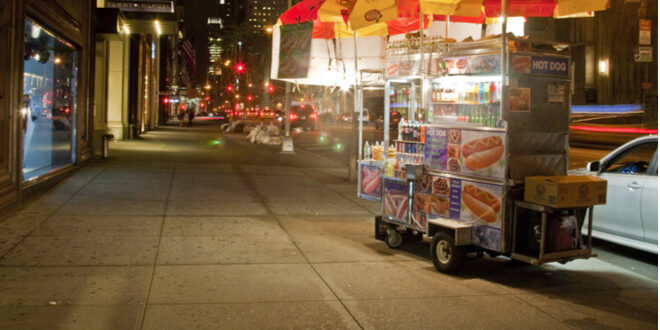Nearly one year ago, Fontana introduced a program it hoped would get the city’s growing street vendor problem under control.
It would pay those business to be legitimate, city-permitted operations, especially those that served meals on makeshift tables set up along sidewalks. That practice has been around for years all over California, then grew in popularity during the pandemic and seems to have gotten bigger since then.
The Sidewalk Vendor Reimbursement Program would pay street vendors up to $2,000 to operate with a city business permit, like a regular restaurant. The payment would be enough to cover insurance and the business permits required by the city and San Bernardino County, said Phil Burum, Fontana’s deputy city manager.
Once those conditions were met, a street vendor would be allowed to operate legally in Fontana. If they sold food, it must be prepared off-site, not on the street.
In addition to generating sales tax revenue, Fontana officials believed the program – while not eliminating street vending altogether – would make it easier for the city’s code enforcement officers to regulate the practice.
“We want to get people off the sidewalks so they’re not running into each other, and not eating at a place where you can’t wash your hands or go to the bathroom,” Burum said last July, two months after the reimbursement program began.
Mayor Acquanetta Warren compared eating food served by a street vendor to eating in a restaurant with a C rating from the San Bernardino County Department of Health, the department’s lowest grade.
“We have a lot businesses operating illegally in Fontana, and we have to do something about that,” Warren said last year. “They carry all of their stuff in a U-Haul, find a place on the sidewalk and then set up. Why would you go to [an unregulated] place that doesn’t have a bathroom or a refrigerator?”
Unfortunately, the sidewalk vendor program was never really put to the test.
“No one signed up for it,” Burum said last week. ‘It went away after six months. At that point, we decided we needed to take a different approach.”
That different approach appears to be working, at least for now.
Fontana has made “significant progress” in making sure its street vendors follow all health and safety regulations that to apply food service, having strengthened its enforcement of those regulations last November.
First, the city began sending out two three-member inspection teams, six nights a week, to look for vendor code violations. If the violations are serious enough, the city will impound the vendors’ equipment for 30 days. If the equipment isn’t claimed in that time, it’s disposed of.
Fontana officials also sponsored a workshop in January with the San Bernardino County Department of Public Health that explained the permitting process all vendors must comply with or risk being put out of business.
“It is never legal to prepare and sell food on the street,” Burum said. “You can sell food that was cooked and prepared in a kitchen, but you can’t cook something on the street and sell it.”
Street vending happens statewide, but the state legislature has, for the most part, left regulating the practice in local hands.
In 2018 it adopted the Safe Sidewalk Vending Act, which forbids cities and counties from treating street vending as a crime. It does allow local municipalities to pass non-criminal law to protect public health safety.
State law also requires that people be able to wash their hands or use the bathroom near wherever food is prepared. Those two things are rarely, if ever, provided by even the most conscientious a street vendor.
“We decided pay more attention to the issue, and to devote more resources to solving the problem,” Burum said. “When we find a vendor we ask them if they have a business license with the city. If they don’t, we tell them what they need to do to get one.”
That approach appears to be working, at least for now.
Since December, no street vendors have been arrested in Fontana, and 10 vendors have been licensed by the city, according to a statement released by the city last month.
Ten vendor permits are currently being processed, and the city has issued 266 warnings, made 29 perishable confiscations, 29 impoundments and made five impoundment recoveries.
The program has made enough progress that the city has reduced the size of its enforcement teams to two members each, although they still patrol the city six nights a week.
When the enforcement program began, Fontana was spending $100,000 a month on policing their street vendors. Now, it’s spending about $40,000 a month.
“We shouldn’t have to spend that much,” Burum said,
The city’s impounding of vending equipment is also being copied. San Diego, Santa Barbara, Anaheim and Riverside County have all recently adopted similar ordinances, according to the statement.
Anaheim began cracking down on its street vendors several years ago, particularly those who were blocking sidewalks or otherwise disrupting pedestrian traffic, said Mike Lyster, the city’s chief communications officer.
“It’s a significant issue for us, but we’re not anti-street vending,” Lyster said. “Done correctly, it can be a good thing for the city. There were health issues, but our main problem was we couldn’t have people blocking the sidewalks.”
Fontana, which modeled some of its early attempts to regulate street vendors on Anaheim’s efforts, may have done as much as its can to make the practice a legitimate business.
“We have it under control now, and that’s probably as good as we’re going to do,” Burum said. “I don’t think we’re ever going to eliminate it entirely. My prediction is that street vendors will always be around.”
 IE Business Daily Business news for the Inland Empire.
IE Business Daily Business news for the Inland Empire.


